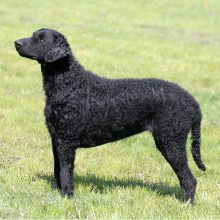Curly Coated Retriever
Lifestyle Needs

The Curly Coated Retriever is an intelligent and strong dog, with the stamina to keep going all day. An excellent shooting dog. He needs to live in a house with a big enough garden and preferably close to open countryside. He should have more than two hours exercise every day on average . His tightly curled coat is waterproof and most CCRs will jump into water whenever they get the chance. His unusual and specialised coat requires professional grooming to prevent the collection of debris and resulting skin problems.
Genetic Diversity
(Known as Coefficient of Inbreeding: 'COI'. It should be as low as possible.)
The UK Kennel Club breed average COI is 13.5% - See 'A Beginners Guide to COI'
Gene Pool Size
(Known as Effective Population Size: 'EPS')
32.68
EPS is a measure of how many individuals are contributing genetically to a breed population. It is a measure of the size of the gene pool in a breed. Lower than 100 is considered critical by conservationists and below 50 brings a breed close to extinction. For more information see the Kennel Club article.
Health and Welfare Problems due to Conformation
(Body shape and physical characteristics)
- His unusual and specialised coat requires professional grooming to prevent the collection of debris and resulting skin problems.
- Gastric dilation volvulus (GDV) (Bloat/torsion)
BVA/KC Health Schemes: www.bva.co.uk/chs
- Hip dysplasia: breed 5 year mean score 11 (parents should be lower)
- Elbow dysplasia: ideally O:O
- Eye disease: Progressive retinal atrophy (PRA) (annual testing), other eye diseases
Estimated Breeding Values (EBVs) : No EBVs are currently available for this breed
www.thekennelclub.org.uk/about-ebvs
DNA Tests Available
DogWellNet and IPFD Harmonisation of Genetic Testing for Dogs (HGTD)
www.dogwellnet.com/breeds
- Exercise Induced Collapse (EIC_IncP)
- Progressive Retinal Atrophy (PRA cord 1)
- Progressive retinal atrophy (PRA crd 4)
Availability of a DNA test does not mean that it is always necessary or even desirable for breeders to use this test.
Other Breed-Specific Health Screening Schemes
None known
Ask the breeder to show you the certificates for the above tests/screening for both parents. If any of the above tests have not been considered necessary by the breeder (and there may be good reasons), ask her to explain why.
Other Diseases Reported
(For which there are currently no genetic or screening tests for sire or dam)
- Entropion
- Distichiasis
- Epilepsy / Seizures
- Hereditary cataract
- Renal failure
- Cancer, especially Lymphoma
- Allergies
Ask the breeder about the medical history of the parents, grandparents and great grandparents. Consider carefully whether to purchase a puppy if some of these or other diseases are in the family line.
Ask about the breeder’s policy in cases of serious genetic diseases occurring to your puppy in later life. Good breeders will request to be informed of such events in order to improve future breeding decisions.
You are strongly advised to buy from a breeder who uses (or is prepared to use) the AWF Puppy Contract and Puppy Information Pack (PIP): www.puppycontract.org.uk
The breeder should also be familiar with the CFSG/DBRG Code of Practice for Dog Breeding
Or the Kennel Club’s Assured Breeders Scheme Standard and Guidance:
Standard PDF | Guidance PDF